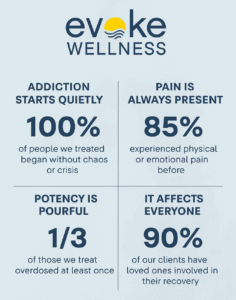Even after years of sobriety, some truths sit heavier than others.
Like the fact that fentanyl didn’t just reshape the overdose crisis—it reshaped what recovery even means.
Maybe you’re someone who got clean years ago, but when fentanyl hit your town, it felt like the world changed under your feet. Maybe you’re sober but scared for someone else. Or maybe you’ve started to wonder if your own recovery still fits the way it used to.
At Evoke Wellness in Cohasset, we’ve seen how fentanyl has shifted everything. That’s why our approach to fentanyl addiction treatment isn’t just about getting people clean. It’s about meeting the moment—this one—and treating the people and families still carrying the weight.
Why We Think Fentanyl Addiction Happens
Fentanyl addiction rarely starts in chaos. It often begins quietly.
Sometimes with real physical pain. Sometimes with a search for relief that no one knew how to name. Sometimes it’s medical. Other times it’s emotional. But always, it’s human.
We believe fentanyl addiction isn’t just about the substance—it’s about unmet pain, disconnection, and a brain wired to survive.
Fentanyl is fast. It hijacks pain pathways, floods dopamine, and quickly convinces the body it can’t live without it. But beneath that physiological hook is something deeper. Most people we’ve treated weren’t looking for a high. They were looking for quiet. For numbness. For a break from something too heavy to carry alone.
That’s why our Fentanyl Addiction Treatment in Massachusetts focuses on more than just detox—it begins with understanding. At Evoke, we start there—not with blame, but with context.
How Fentanyl Addiction Impacts the Person and the Family
It’s not just a drug. It’s a disruption.
Fentanyl can fracture relationships, routines, and realities. For the person using, it creates a painful loop: numb out → need more → lose control. For their loved ones, it creates a kind of grief-without-a-funeral—a slow mourning of someone still alive.
We’ve worked with families in Cohasset and throughout Massachusetts who feel helpless, terrified, and unsure if the person they love is still in there.
But they are. And so are you, if you’re the one carrying the addiction.
Treatment has to understand this ripple effect. That’s why our approach supports both the person using and the people who care about them.
What Our Fentanyl Addiction Treatment Looks Like
At Evoke Wellness at Cohasset, our fentanyl-specific treatment framework combines medical safety with emotional honesty. Because both are essential.
Here’s what our care includes:
- Detox that doesn’t punish. Medically monitored withdrawal support that prioritizes dignity and comfort.
- Clinical depth. Licensed therapists trained in trauma, grief, and identity work—not just symptom management.
- Family engagement. Support for loved ones who need clarity, boundaries, and relief—not just education.
- Peer community. Group spaces that are real, not rehearsed—where people talk about fentanyl, fear, and what healing actually takes.
- Aftercare that doesn’t disappear. Step-down planning, alumni support, and a local recovery network that lasts beyond discharge.
We also build flexibility into our model. If you’ve been through programs before, we don’t make you start from scratch. And if you’ve never told your story, we give you space to find your voice without pressure.
Why Treating Fentanyl Addiction Requires a Different Approach
Fentanyl isn’t just “another opioid.”
It’s 50 to 100 times more potent than morphine. It attaches to opioid receptors more aggressively. It causes physical dependency faster. And it increases overdose risk dramatically—often within weeks of regular use.
But fentanyl’s danger isn’t only chemical. It’s psychological.
Fentanyl works so well at numbing pain that many people feel less safe in early sobriety than they did while using. Without the right therapeutic support, that emotional whiplash becomes a major relapse risk.
That’s why we don’t just treat the addiction—we help people build lives that feel possible to stay present in.
Why We Keep Showing Up
Working in fentanyl addiction treatment can feel like chasing a moving target. But we do it anyway—because every person who walks into our center is more than the worst thing that’s happened to them.
We keep showing up because:
- We’ve seen people walk back in after relapsing and leave stronger than ever.
- We’ve watched families rebuild trust after years of heartbreak.
- We’ve held space for clients who didn’t think they’d live to see recovery—but did.
This work matters not because it always succeeds—but because every single success changes a life, a family, a community.
And that’s worth everything.
For Our Alumni Who Feel Distant, Flat, or Disconnected
Maybe you’re already sober. Maybe fentanyl was never your story—but it’s touched the people around you.
Or maybe your sobriety feels like something you protect, but don’t feel.
That matters too.
At Evoke, we see long-term alumni who are still sober but quietly struggling. Not with cravings—but with meaning. With loneliness. With emotional flatness.
If that’s you, please know this: you don’t have to crash to ask for support.
Sobriety isn’t just about staying off substances—it’s about staying connected to yourself, to people, and to what you care about. And if those connections feel shaky, we’re here. No judgment. Just options.
Peer Quote
“I didn’t relapse, but I did feel like I lost something. Evoke helped me reconnect—not just with recovery, but with my own life.”
– Evoke Alumni, 2022
FAQs: What to Know About Fentanyl Addiction Treatment at Evoke
Is your treatment different for fentanyl versus other opioids?
Yes. Fentanyl’s potency and relapse risk require tailored medical protocols and deeper psychological support. We address both in our care plans.
Do you treat people who’ve relapsed multiple times?
Absolutely. We know recovery is not linear—especially with fentanyl. Many of our clients return stronger after previous treatment attempts.
Can I come back even if I’ve been through Evoke before?
Yes. We welcome returning alumni with openness and respect. There’s no shame in needing more support.
Do you offer support for families during treatment?
Yes. We provide education, therapeutic support, and connection for loved ones. Healing doesn’t happen in isolation.
I’m sober but struggling emotionally. Can I still get help?
Yes. We offer support for emotional health, purpose, and reconnection even if you’re not using. You don’t need a crisis to be worthy of care.
Wherever You Are, We’re Here
Whether fentanyl addiction is part of your past, present, or someone you love, you’re not alone—and you’re not too late.
Call 866-931-6429 or visit Contact Us to learn more about our fentanyl addiction treatment services in Cohasset, MA. Let’s meet the moment together—with care that adapts to who you are and what you need now.





